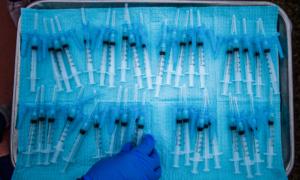Since the outbreak of the pandemic, medical researchers have been unable to define a common set of symptoms for the complex long COVID condition.
A recent study led by the Icahn School of Medicine at Mount Sinai in New York and Yale School of Medicine discovered that people suffering from long COVID have distinct hormonal and immune differences, and that long COVID is a biological disease with specific biomarkers that can be used to differentiate the condition.
“These findings are important—they can inform more sensitive testing for long COVID patients and personalized treatments for long COVID that have, until now, not had a proven scientific rationale,” said principal investigator David Putrino in a Mount Sinai news release about the discovery.
“This work is so exciting because it is one of the first to show us clear, measurable differences in blood biomarkers of people with long COVID compared with people who recovered fully from an acute infection and a group of people who have never been infected with SARS-CoV-2 (the virus that causes COVID-19). This is a decisive step forward in the development of valid and reliable blood testing protocols for long COVID.”
Chronic Ailments
A recent study published in The Lancet found there were higher rates of lung, brain, and kidney injuries in people suffering from long COVID, with lung injuries about 14 times higher than those in the control group.In 2022, the U.S. Centers for Disease Control and Prevention said that nearly 1 in 5 people who had COVID-19 in the past were still suffering from long COVID symptoms in the United States. Overall, 1 in 3 American adults have COVID symptoms that last three or more months after first contracting the virus.
The recent study analyzed 271 patients from Mount Sinai Hospital, Mount Sinai Union Square, and Yale School of Medicine between January 2021 and June 2022, with investigators dividing them into three groups.
The first set were those with no prior COVID-19 infection. The second set fully recovered from a clinically confirmed case of COVID-19, and the third group suffered from active long COVID symptoms for at least four months or more. The median duration of long-term symptoms was 12 months after the acute infection.

Researchers took blood samples identifying biomarker differences and similarities between the groups. Machine learning analysis was conducted to understand which biomarkers were most effective in allowing the algorithm to identify patients with long COVID.
Findings
Researchers found that those suffering from long COVID had “pronounced” immune and hormonal dysfunction “characterized by biomarkers indicating abnormal T cell activity, reactivation of multiple latent viruses (including the Epstein-Barr virus and other herpesviruses) and significant reductions in cortisol levels.”Mr. Putrino said that long COVID can be identified using the blood testing protocols used in the study, but the disease process varies between individuals based on their medical histories.
“This means that physicians must listen to their patients and perform a wide variety of physiological and lab tests, while adopting a highly personalized approach to the medical management of long COVID,” said the doctor. “There is no ‘silver bullet’ for treating long COVID, because it is an illness that infiltrates complex systems such as the immune and hormonal regulation. Complex illnesses require complex treatment solutions and we need more rapid research to better understand long COVID and discover new and promising therapies.”
Akiko Iwasaki, co-principal investigator, added that the biomarkers need to be validated in larger studies but “provide a first step in dissecting the disease pathogenesis of long COVID.”
“There is a post-COVID symptomatology ... but I don’t think we understand the biological basis; we can’t define it very clearly. So to make a statement that it was more or less common after certain variants or vaccines is pretty difficult,” Dr. Cody Meissner, a professor of pediatrics at the Dartmouth Geisel School of Medicine, told The Epoch Times in a previous report.
Long COVID and vaccine injuries share similar symptoms. Some experts are concerned that studies on long COVID could dismiss vaccine injuries and hide potential scrutiny on vaccine manufacturers and federal agencies approving the injections.







